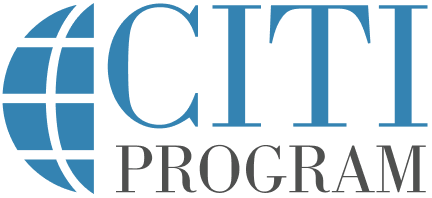The Trusted Standard in Research, Ethics, Compliance, and Safety Training
The Collaborative Institutional Training Initiative (CITI Program) is dedicated to serving the training needs of colleges and universities, healthcare institutions, technology and research organizations, and governmental agencies, as they foster integrity and professional advancement of their learners.



Explore Our Featured Courses
Provides instructions for creating the structures, personnel, and funding for a clinical research program.

Provides essential training on why privacy awareness and compliance matter.

A comprehensive introduction to ethical principles, regulations, and responsible practices that guide software and technology professionals throughout the software development lifecycle.

The course explores OPSEC in academia, training faculty, staff, and students to identify and mitigate risks to sensitive research data while upholding open science principles.

Equips university faculty, staff, administrators, and students with essential knowledge on Title IX compliance and program assessment to foster safer, more effective, and student-centered campus environments.

Helps clinical and operations leaders in safety-net and low-resource healthcare settings develop literacy and confidence in AI.

Equips research personnel with the skills and insights necessary for effective mentorship.

Explores how generative AI (GenAI) can support science communication.

Presents a scalable model for creating a research coordinator float pool to provide flexible staffing, structured training, and broad support for clinical research across institutions.

Describes how to calculate the appropriate sample size for different study designs and outcomes.

These courses explore key topics related to research security and international engagement.

Examines the application of IRB exemptions, focusing on overlooked flexibilities in categories 1 through 3 through discussion and real-world examples.

Provides a review of what COI committee members need to know.

Introduces you to key information about, and tools to use, the 3Rs of animal research.

This course provides learners with a review of contemporary bioethics issues.

The RCR Casebook course is a collection of real-world ethical dilemmas designed to promote discussion, critical thinking, and skill-building in RCR.

Explore the impact of academic integrity from the perspective of both students and faculty/staff.

Prepares you to apply digital health ethics in healthcare and research.

Explores issues that lead to research misconduct and ways to develop trust with faculty and leadership.

This webinar for IRB, IACUC, and sponsored program administrators covers seven key compliance elements with strategies and case studies to strengthen research, reduce risk, and promote integrity.

Foundational and advanced courses provide critical information and best practices for IRB administration.

This course prepares researchers and educational technology developers to navigate COPPA’s legal requirements, conduct compliant research, and engage with digital environments used by children under 13.

Describes the regulatory framework and quality programs for HCT/Ps

This course provides essential practices for those working with high-risk biological materials, clarifying biosafety vs. biosecurity and enabling practical biosecurity planning to prevent theft, misuse, or intentional release.

The webinar explores effective collaboration between IACUC and IBC, detailing their roles, regulatory responsibilities, and best practices to ensure safe and ethical life sciences research while enhancing oversight and protecting workers and animals.

An overview of PCTs, their ethical complexities, best practices, and institutional considerations.

Provides the fundamentals of ergonomics across different settings.

Helps develop leadership skills to meet today’s changing, diverse, and dynamic environments.

This course offers advanced training for experienced researchers and leaders in responsible research conduct, emphasizing integrity, ethical leadership, and fostering healthy research environments.

This course equips faculty, staff, and administrators with the fundamentals and tools to measure outcomes, improve learning, and effectiveness.

N2 is a not-for-profit alliance of Canadian research networks and organizations working to enhance national clinical research capability and capacity.

BIC Study Foundation is a resource for those who want to take CITI Program courses in Korean. They are a certified training provider by the Korean FDA/MAFRA for HRPP and ACU Programs.

A complete research compliance suite that supports IRB, IACUC Conflict of interest, Bio Safety Export Control, and more.

HRP Consulting provides customized services for your research program, including temporary staffing, IRB/IACUC assistance, accreditation support, program evaluations, training/education and more.

CTrials helps grow sponsored research programs by taking on the many administrative challenges inherent in managing clinical trials.

Informed Consent Builder is a cloud-based platform that streamlines the process of managing and generating informed consent forms.

Protocol Builder is an online protocol writing and collaboration platform that also speed up your pre-review turnaround times.


Courses Approved by Top Continuing Education Accreditors
CITI Program courses are approved for CME credits through the Albert Einstein Montefiore Continuing Professional Development Center (CPDC). Albert Einstein College of Medicine-Montefiore Medical Center (Einstein) is accredited by the Joint Accreditation for Interprofessional Continuing Education to provide continuing education activities for healthcare professionals. Einstein is accredited to offer continuing education credit for the following professions: medicine, nursing, psychology, pharmacy, dentistry, optometry, social work, nutritional science, and athletic training.
CITI Program is also accredited by the International Accreditors for Continuing Education and Training (IACET) and offers IACET CEUs for its learning events that comply with the ANSI/IACET Continuing Education and Training Standard. IACET is recognized internationally as a standard development organization and accrediting body that promotes quality of continuing education and training.
Join Over 2,500 Subscribing Organizations
Highlighted below are just a few select subscribers & collaborators.










Meet A Few Of Our Expert Authors and Presenters
Our courses are built by over 350 highly qualified experts and rigorously peer reviewed to incorporate various perspectives and ensure accuracy, completeness, and overall quality.

Katherine Leibowitz, JD
Leibowitz LawKatherine has provided legal services relating to clinical trials for almost 25 years. Clients of her boutique regulatory and technology transactional law firm include sponsors, institutions, technology providers, and CROs. Leibowitz Law provides clinical research, regulatory compliance, technology and data, and corporate and commercial services to the life sciences community.

W. Kent Barnds, MS
Augustana CollegeW. Kent Barnds is a higher education strategist with over 30 years of experience in the non-profit sector. Known for his leadership in strategic planning, enrollment management, and communication, Kent has held key positions, including Executive Vice President and Vice President for Enrollment, Communication, and Planning at Augustana College.

Mary Ellenberger, DVM, MS, DACLAM
Washington University in St. LouisMary Ellenberger has over 35 years of experience in the management of lab animal care and use programs. Following her residency program at MIT, she held positions at a number of Boston academic institutions and corporations. She has been with Washington University Division of Comparative Medicine since 2006.

Christina Kuhn, Esq
Covington & Burling LLPChristina Kuhn advises medical device, life sciences, and technology companies on FDA regulation of AI, software, and digital health products. She helps companies navigate the FDA medical device framework to develop go-to-market strategies for innovative and emerging health technologies and manage compliance across the product lifecycle.
In Our Learners' Words

Latrice J.
DSW Graduate Student
I enjoyed the comprehensive coverage of topics related to informed consent in the 21st century, including the use of technology in the consent process and federal guidance on multimedia tools and electronic consent forms.

Tony P.
English Language Arts Teacher
I liked how user-friendly the course modules were.

Delores K.
Clinical Research Nurse
I appreciate being able to learn via a recorded live presentation supported by slides containing key information. I like how the information can be saved and referenced at a later time.

William J.
Cluster Director of Pharmacy & Research
The interactive modules are amazing. It’s like being at a course in person, but with the ability to review something if extra help is needed.
Recent News & Articles

New Course – Establishing a Clinical Research Program
The course supplies learners with an understanding of how to set up a clinical research site, assemble a research team, build a clinical trial portfolio, and more.
Read the article
Clinical Research for Practicing Clinicians: How to Build Your First Site
Launching a clinical research site can feel like adding a new service line to an already full clinic schedule. Most first-time sites don’t struggle because...
Read the article
Association for Practical and Professional Ethics (APPE) 2026 Conference
Join The APPE for its annual conference, themed “What Do We Owe Each Other?” which explores ethical responsibilities in a complex world.
Read the article
